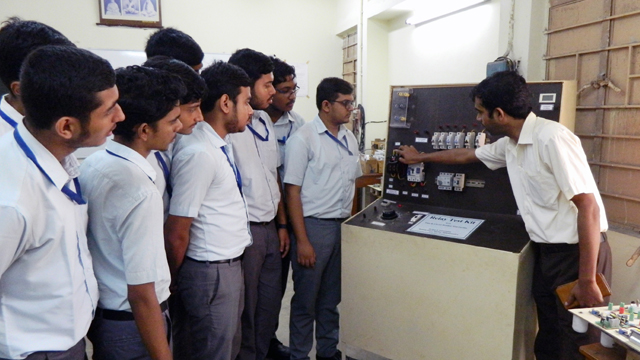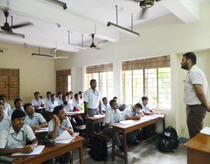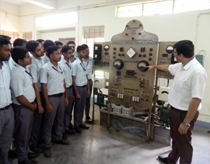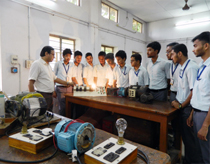The driving force that runs industries as well as nations.
Electrical energy is the driving force that runs industries. As the manufacturing world moves forward bringing in greater incidence of precision equipment at all levels of society, the demands for power and its control & regulation are also increasing.

Electrical Department Lab
Programme Specific outcomes(PSO):
• Multi-disciplinary approach: Adopt a multi-disciplinary teaching-learning approach for inculcating a holistic engineering view among the students
• Integrated approach to Electrical Engineering through cross-linkages between Electric Machines, Power Electronics, and Automation
Program Outcome (PO) of the Department:
1. Basic and Discipline specific knowledge: Apply knowledge of basic mathematics, science and engineering fundamentals and engineering specialization to solve the engineering problems.
2. Problem analysis: Identify and analyse well-defined engineering problems using codified standard methods.
3. Design/ development of solutions: Design solutions for well-defined technical problems and assist with the design of systems components or processes to meet specified needs.
4. Engineering Tools, Experimentation and Testing: Apply modern engineering tools and appropriate technique to conduct standard tests and measurements.
5. Engineering practices for society, sustainability and environment: Apply appropriate technology in context of society, sustainability, environment and ethical practices.
6. Project Management: Use engineering management principles individually, as a team member or a leader to manage projects and effectively communicate about well-defined engineering activities.
7. Life-long learning: Ability to analyse individual needs and engage in updating in the context of technological changes.
Name of the Lab / Workshop:
Machine Lab
Switchgear & Protection Lab
Analog & Power Electronics Lab
Transmission & Distribution / Illumination Lab
Digital Electronics/ eYantra Lab
Renewable Energy Power Plant / Automation (Relay control) Lab
Measurement & Circuit Theory / Automation (Sensor) Lab
Microcontroller / PLC Lab
FEEE / Building Electrification Lab
AutoCad Lab

Vision of the Department
To impart quality education & training to students so that they can become competent Electrical Engineers who will be capable of supervising and leading Technical activities at their place of work, and also contribute to the well-being of the society as Responsible & Enlightened Citizens.
......................................

Mission of the Department
• To provide the students with strong foundations in bases of Electrical Engineering, and allied disciplines.
• To impart core competencies and exposure to students on a range of equipment and methods employed in industrial workplace so that they can function as contributing professionals from day one.
• To undertake periodic curricular revision and upgrade the laboratories and workshops with latest equipment.
• To keep up to date with current trends in the field of Electrical Engineering through continuous learning activities of faculty members and involvement in challenging student projects.
• To carry out interdisciplinary research and consultancy to generate practical engineering solutions.
......................................

Program Educational Objective (PEO) of the Department:
• To provide Analytical foundation of the Theory and Practice of Electrical Engineering.
• To give exposure to students on facets of Engineering Practice, and underlying Design aspects of existing technologies.
• To train budding engineers in systematic Fault-location and Problem-solving skills necessary in Professional workplace.
• To sensitize the students on social and environmental dimensions of engineering activities so that they handle can complex real-life situations with a sense of dedication displaying integrity and born out of professionalism team-work, self-management, and effective decision-making.
• To endow the students with tools for self-learning so that they can pursue higher education, and career enhancement through life-long professional up-skilling.
......................................
